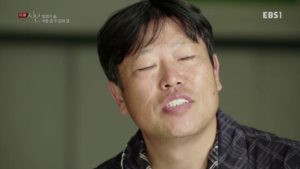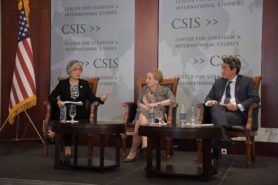강경화 외교장관 국제전략문제연구소(CSIS) 영어연설 전문
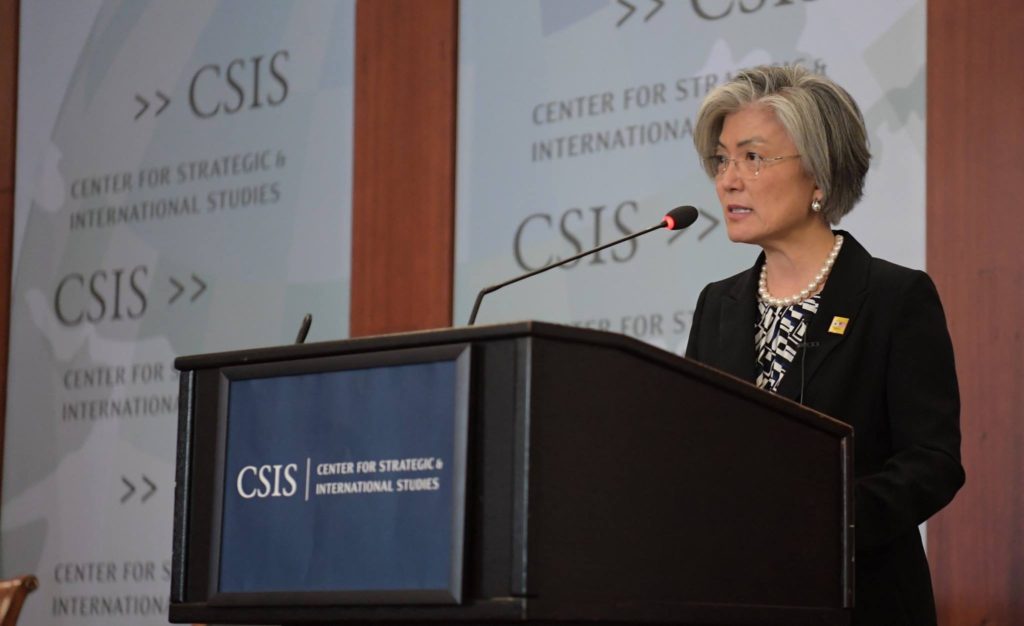
강경화 외교장관은 워싱턴 DC에서 개최된 아산 정책연구원과 국제전략문제연구소(CSIS) 공동 주최 세미나에 참석, 美 학계·재계 ·언론계 등 각계 인사 300여명을 대상으로, ‘한미 동맹과 북핵 문제‘를 주제로 기조 연설과 정책 대담을 실시하였다.
강 장관은 국무장관으로서 최초로 북한을 방문한 바 있는 매들린 올브라이트 前 국무장관과 대담을 갖고 북핵 문제의 평화적 해결을 위한 방안에 대해 심도있는 의견을 교환한데 이어, 대담 직후에는 별도 면담을 갖고 20년전 북핵 협상을 총괄했던 올브라이트 장관의 경험 등을 바탕으로, 한반도 정세의 안정적 관리 및 북핵 문제의 조속한 돌파구 마련을 위한 외교적 해법에 대해 허심탄회하게 논의하였다.
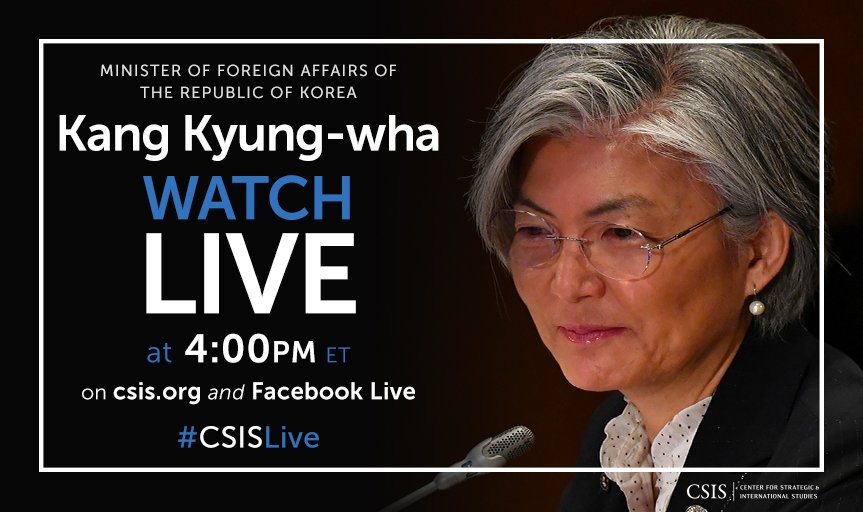
영어 연설문 전문
아산정책연구원-CSIS 공동주최 세미나 기조연설문
Foreign Policy in a New Era: The ROK and U.S.
Organized by the Center for Strategic and International Studies and The Asan Institute for Policy Studies
Keynote Address
by H.E. Kang Kyung-wha
Minister of Foreign Affairs
September 25, 2017, Asan-CSIS Forum
Thank you for your warm welcome. I had the pleasure of accompanying President Moon Jae-in when he came to address here in late June, and it is wonderful to be back in your midst. This is my first own visit to Washington D.C. as Foreign Minister, but today’s event is already my second one with the CSIS, following the first in Seoul just weeks after taking office. And much has happened since then, and I am grateful to the CSIS and the Asan Institute for giving me this opportunity to share some thoughts on the abiding importance and strength of the ROK-US alliance, in particular vis-à-vis the heightened threat of North Korea’s nuclear and missile programs.
My deep appreciation goes to Secretary Albright for being here with us today. You remain an inspiration for all of us.
I arrived here yesterday, after spending an eventful week in New York, the first part of it accompanying President Moon on his first engagement at the UN General Assembly, and the rest in bilaterals and group meetings with my counterparts from various corners of the world, including, of course, Secretary Tillerson and United Nations Secretary-General Antonio Guterres.
Indeed, the North Korean nuclear issue was the main focus of the high-level discussions in New York last week. By many accounts, North Korea’s nuclear program seems to be at a tipping point. The yield of its sixth nuclear test on September 3rd was greater than all of the previous five tests combined. North Korea fired two ballistic missiles over Japan, as if to substantiate its threat of “enveloping fire” around the island of Guam. Indeed, the recent advances made in North Korea’s nuclear and missile capabilities have been much faster than anticipated, and Pyongyang seems fast approaching its stated goal of having nuclear-tipped ICBMs capable of targeting the continental U.S.
Ladies and Gentlemen,
In tackling the North Korean nuclear issue, the vital importance of close coordination between the Republic of Korea and the United States cannot be overemphasized.
So at their second face-to-face meeting in New York last week, our two Presidents once again condemned North Korea’s continued provocations in the strongest terms. They agreed that maximum pressure had to be placed on North Korea in response, and stressed the importance of faithful and thorough implementation of UN Security Council Resolution 2375 and all previous resolutions. The same strong will was also expressed by members of the Security Council during the open debate on non-proliferation.
There was also overwhelming support for my government’s approach to the challenge that is firm and stronger pressure against the provocations, while leaving the door open to dialogue should North Korea change course towards a peaceful and diplomatic solution. The call for diplomacy is also the clear wish of the public, both in Korea and the United States, as recent polls indicate.
Sanctions and pressure against North Korea are a diplomatic tool. They are not meant to collapse or bring down North Korea, but to bring it to the negotiation table for serious denuclearization talks. Furthermore, they are necessary but not enough. They must be accompanied by strong deterrent capabilities. Thus, Presidents Moon and Trump reaffirmed that maintaining overwhelming military superiority over North Korea was essential, and committed to strengthen our robust combined defense posture.
The meeting between the two Presidents served to underscore the clear focus of our alliance in achieving the goal of complete, verifiable, and irreversible denuclearization of North Korea in a peaceful manner, and rallying the support of the international community. Toward that end, the close coordination between the ROK, US and Japan is essential, as is the constant engagement to win the full support of China and Russia.
Ladies and gentlemen,
I am sure you have already seen the North Korean leader’s statement, threatening 'the strongest countermeasures ever' against the United States. This message, delivered in his own name for the first time was echoed by the North Korean Foreign Minister in his speech at the UN. He ramped up the rhetoric this morning to the press stating, “Since the U.S. declared a war on our country, we’ll have every right to take counter-measures.” Indeed, it is very likely that North Korea will conduct further provocations. Under these circumstances, it is imperative that we, Korea and the U.S., together manage the situation with astuteness and steadfastness in order to prevent the further escalation of tension or any kind of accidental military clashes in the region, which can quickly spiral out of control. (일본뉴스에 소개된 부분) There cannot be another outbreak of war in the region. There cannot be another war on the Korean peninsula. The consequences would be devastating not just for the Korean peninsula but for Northeast Asia and indeed the whole community. We cannot put at risk the safety and security of our citizens who have worked tirelessly for seven decades to build a model democracy and market economy from the total destruction of war.
At this very venue last June, President Moon envisioned a very different future for North Korea and the Korean Peninsula. He urged North Korea to choose wisely in deciding its destiny, rather than blaming others for its deepening isolation and economic hardship. In his speech to the General Assembly in the United Nations, President Moon once again stressed that the Korean government does not seek the collapse of North Korea, nor unification by absorption or artificial means. Rather, what we seek is permanent peace on the Korean peninsula and denuclearization of the Korean Peninsula in a peaceful manner. I echo President Moon’s message, which fully resonates with Secretary Tillerson’s “4 no”s policy, calling for a diplomatic solution as the first and foremost preferred approach. North Korea must take heed of our messages and change course. The first step would be for the North to stop its provocations.
The political and diplomatic efforts towards the denuclearization of North Korea and improvements in South-North Korean relations can and must be pursued in a mutually reinforcing manner. In this regard, we once again urge North Korea to respond to our proposals to revive South-North contacts, beginning with the two concrete proposals made on July 17, and start laying the building-blocks for inter-Korean reconciliation and lasting peace on the Korean Peninsula. As President Moon remarked at the United Nations, peace is our calling and our historical duty.
Indeed, the North Korean nuclear issue is the most difficult challenge the Korea-US alliance is facing, but it has also made the alliance even stronger.
In fact, the alliance is as robust as ever, and the ties between our two countries have never been so rich and diverse, so wide and so deep. Over the years and decades, we have seen the alliance evolve into a uniquely vibrant, strategic and fulsome partnership of all-round mutual benefit and ever-expanding horizon for future growth. Allow me to elaborate.
First and foremost, the alliance has served as the anchor of peace and security on the Korean peninsula and in the Asia Pacific region. In the process, it has safeguarded the evolution of a vibrant democracy in South Korea and its emergence as an economic powerhouse of global stature, as well as a reliable military ally of the US in many corners of the world, with increasingly robust capabilities of its own. In the process, Korea’s contribution to the alliance has continued to grow. Korea now is spending 2.4% of GDP for defense, bearing a significant cost of the stationing of U.S. Forces in Korea, and providing the lion’s share for the relocation of Camp Humphreys, which is the largest overseas U.S. military base.
Second, the economic pillar of the alliance, the KORUS FTA, has enabled the U.S. to secure a strong foothold in the Northeast Asian market. The KORUS FTA, America’s first FTA in the region, has provided American companies with greater access to the Korean market, while inviting Korean investments throughout many states in the US. The US has a deficit in goods traded but a surplus in services, and Korean investments in the US have grown many folds during the past five years since the FTA went into effect. Overall, the KORUS FTA has been a win-win deal and a driving force for greater growth and prosperity in both countries. It is, if I may use this word, the material key, far beyond economic ties, that locks in our peaceful and prosperous future together.
Thirdly, Korea has stood shoulder to shoulder with the U.S in tackling global issues. We are working together to meet new challenges in many frontiers and multilateral arenas, most of all at the United Nations. Our collaborations in global health security, human rights and gender equality, science and technology and space, in fighting the threat of ISIS terrorism and violent extremism are only a few of many good examples that I am proud to put forward.
And last but not least, Korea has become a stronghold of democracy and liberal values, of free market economy and trade in a region of vital interest to the United States. The alliance will continue to safeguard the future of a peaceful and prosperous Korean peninsula and the region, and serve our shared security and economic interests, not to mention the values that we together stand for.
Our alliance is now sixty-four years old (or young). It has achieved much, but has a great deal more to do. This is an alliance forged in blood, transformed through decades of painstaking efforts, and striving for lasting peace and prosperity on the Korean peninsula and beyond.
But like all enduring and thriving relationships, the alliance also has issues to work through and problems to solve with care, attention and investment in time and resources. In particular, we must muster the very best of our security and diplomatic endeavors in leading the global community to face down the North Korean nuclear threat, and safeguard our shared security and economic interests. This is also fundamental to preserving nuclear non-proliferation. Committed to denuclearization on the Korean peninsula, Korea is a leading voice in the WMD non-proliferation regimes, which are essential to the global security architecture.
However, this is a task not just for our governments. At the core, the alliance is grounded upon the shared values of democracy, rule-of-law and human rights that are the foundations of both of our countries and cherished by our two peoples. And there is nothing as abiding and strong as values that make for abiding and strong relationships. Thus, we need the active interest and support of our citizens, especially opinion leaders such as all of you here today and future opinion leaders from Asan Institute fellows here at CSIS.
Born of the candlelight rallies and the earnest aspirations of the people for greater transparency and accountability in our democracy, my government is committed to taking public diplomacy and outreach, both inside and outside the country, to a whole new level. Central to that effort is to assure the continued grounding of our alliance in the hearts and minds of our peoples. We will take the alliance from good to great together, and that calls for the active and thoughtful support of all of you here.
Thank you.
CSIS 세미나 풀버전
South Korean Minister of Foreign Affairs Kang Kyung-wha and Madeleine K. Albright discuss the US-South Korea alliance.
국문 번역본
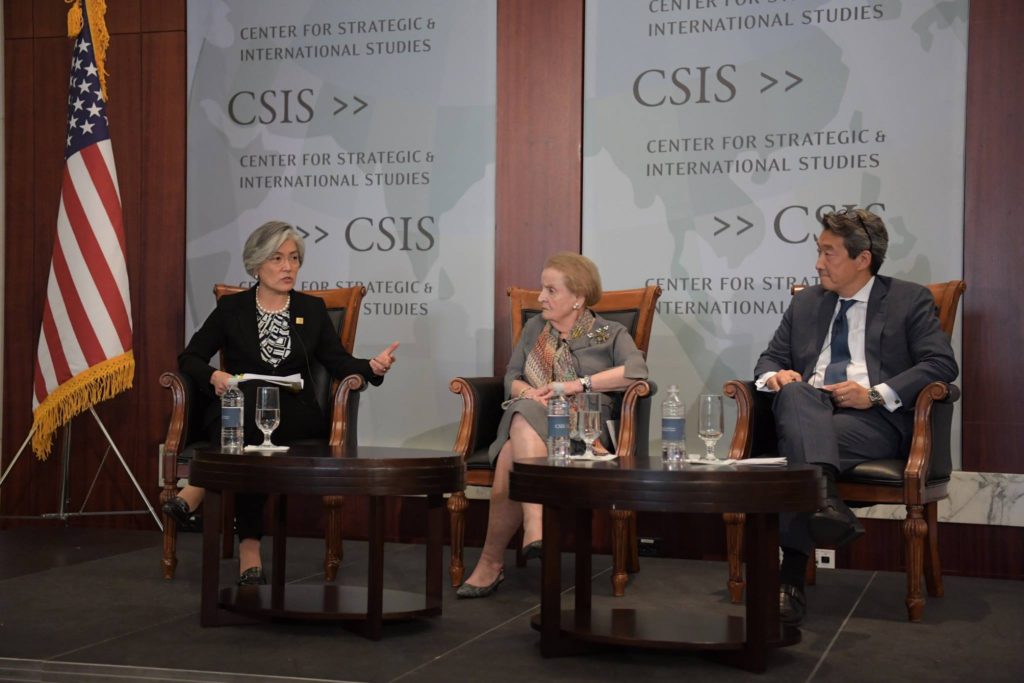
강경화, 매들린 올브라이트, 주한미대사로 내정된 것으로 알려진 빅터 차
따뜻한 환대에 감사드립니다.
지난 6월 문재인 대통령의 CSIS 연설 행사를 수행하여 CSIS를 방문한 이후, 다시 여러분들을 만나게 되어 기쁘게 생각합니다.
외교장관으로서의 단독 워싱턴 DC 방문은 이번이 처음이지만, 금번 CSIS 연설은 취임 수 주 후에 이루어진 서울에서의 연설에 이어 벌써 두번째입니다.
그 이후 많은 일들이 발생했습니다.
한미 동맹의 변함없는 중요성과 힘, 특히 고조된 북한의 핵과 미사일 위협에 대한 생각을 나눌 수 있는 기회를 주신 CSIS와 아산정책연구원에 감사드립니다.
올브라이트 장관께도 깊이 감사드립니다. 우리 모두에게 여전히 영감을 주고 계신 분이시기도 합니다.
본인은 뉴욕에서의 숨 가빴던 한 주를 보내고 어제 이곳에 도착했습니다.
뉴욕 일정의 앞부분에서는 문 대통령의 첫 UN 총회 일정을 수행했고, 나머지 부분에서는 틸러슨 국무장관과 구테레스 사무총장을 포함한 각국 외교장관들과 양자 또는 다자 일정을 가졌습니다.
실로, UN 총회 계기 고위급 협의의 주된 초점은 북핵문제였습니다.
북한의 핵 프로그램이 임계점에 다다른 것으로 보인다는 것이 일반적인 평가이기도 합니다.
지난 9.3 북한의 6차 핵실험의 위력은 이전 5번의 핵실험을 합친 것보다 더 강력했습니다.
북한은 괌을 포위 사격하겠다는 자신들의 위협을 입증하기라도 하듯이, 일본 상공을 통과하는 미사일을 두 차례 발사했습니다.
최근 북한의 핵·미사일 능력은 당초 예상보다 훨씬 빠른 속도로 진전되고 있으며, 美 대륙을 겨냥할 수 있는 핵탄두를 탑재한 ICBM 확보 목표에 빠르게 접근해 가고 있는 것으로 보입니다.
내외귀빈 여러분,
북핵 문제를 다루는 데 있어서 한미간 긴밀한 공조의 중요성은 아무리 강조해도 지나치지 않습니다.
한미 양국 정상들은 지난주 뉴욕에서 두 번째로 만나, 북한의 지속적인 도발을 재차 강력히 규탄했습니다.
양국 정상들은 북한의 도발에 대응하여 최대한의 대북 압박이 가해져야 한다는 데 동의하면서, 안보리 결의 2375호를 포함한 이전 결의들의 충실하고 철저한 이행의 중요성을 강조하였습니다.
UN 안보리 비확산 관련 공개 토론에서도 많은 회원국들이 강력한 의지를 한 목소리로 표명하였습니다.
북한의 도발에 대해서는 단호하고 강력하게 대응하는 한편, 북한이 평화적·외교적 해결의 길을 선택할 경우 대화의 문은 열려있다는 우리 정부의 입장에 대한 압도적인 지지도 확인되었습니다.
최근 여론조사 결과가 보여주듯이, 한국 국민 뿐 아니라 미국 국민들도 외교가 나설 것을 요구하고 있습니다.
북한에 대한 제재와 압박은 외교적 수단에 불과합니다.
이는 북한을 붕괴시키거나 무너뜨리려는 것이 아니라, 비핵화 대화를 위한 진지한 협상 테이블로 북한을 이끌어 내기 위한 것입니다.
압박과 제재는 필요하지만 충분하지 않습니다. 강력한 억지력이 동반되어야 합니다.
이는 문 대통령과 트럼프 대통령이 북한에 대한 압도적인 군사적 우위를 유지하는 것이 필수적이라는 점을 재확인하면서, 굳건한 연합방위태세를 강화해 나가기로 합의한 이유이기도 합니다.
금번 한미 정상회담은 동맹의 목표를 분명히 하는 계기가 되었습니다.
그것은 완전하고, 검증가능하며, 비가역적인 북한 비핵화를 평화적인 방식으로 달성하기 위해 국제 사회를 규합하는 것입니다.
이를 위해서는 한미일 공조 및 중국과 러시아의 협력 견인을 위한 지속적인 관여가 중요합니다.
신사 숙녀 여러분,
여러분 모두 ‘사상 최고의 대미 초강경 대응조치’를 경고한 북한 지도자의 성명을 이미 보셨을 것으로 생각합니다.
처음으로 자신의 명의로 발표된 이러한 메시지는 북한 외무상의 유엔 총회 기조연설을 통해 반복되었습니다.
그리고, 오늘 아침, 북한 외무상은 “미국이 우리나라에 선전포고를 한 이상, 우리는 모든 자위적 대응 권리를 보유하게 될 것”이라며 공개적으로 레토릭의 수위를 높였습니다.
실제로, 북한이 추가도발을 감행할 가능성이 매우 높아 보입니다.
이러한 상황에서, 통제불능 상태로 빠트릴 수 있는 추가적인 긴장 고조나 우발적인 군사충돌을 방지하기 위해서는 한미가 경각심을 갖고 안정적으로 상황을 관리하는 것이 필수적입니다.
다시는 한반도에서 전쟁이 발생해서는 안됩니다.
전쟁의 후과는 한반도 뿐 아니라 동북아, 그리고 전세계에 엄청난 영향을 미칠 것입니다.
한국전쟁의 폐허로부터 모범적인 민주주의와 시장경제를 세우기 위해 70년 간 끊임없이 노력해온 우리 국민들의 안전이 위험에 처하도록 할 수 없습니다.
지난 6월 바로 이 자리에서, 문 대통령께서는 북한과 한반도의 새로운 미래를 제시하신 바 있습니다.
대통령께서는 북한에게 심화되는 고립과 경제난에 대해 다른 나라들을 탓하기 보다는 스스로의 운명을 현명하게 결정할 것을 촉구하였습니다.
또한, 유엔 총회 기조연설을 통해 한국 정부가 북한의 붕괴나 어떤 형태의 흡수통일이나 인위적인 방식의 통일을 추구하지 않을 것임을 재천명하였습니다.
오히려, 우리가 진정으로 추구하고 있는 것은 평화적인 방식으로 한반도 비핵화를 이루고, 한반도에서 항구적인 평화를 구축하는 것입니다.
본인은 북핵 문제의 외교적 해결을 가장 선호하며 최우선시한다는 틸러슨 국무장관의 ‘4 no’ 정책과 일맥상통하는 문 대통령의 메시지를 반복코자 합니다.
북한은 우리의 메시지에 호응하여 그 행로를 바꾸어야 합니다. 이를 위한 첫 단계는 추가 도발 중단입니다.
북한 비핵화와 남북 관계 개선을 위한 정치적·외교적 노력은 상호 추동적인 방식으로 추진될 수 있고, 추진되어야만 합니다.
이와 관련하여, 북한이 우리가 7.17 제안한 구체적인 2개의 남북 접촉 구상에 호응함으로써 남북 화해 및 한반도에서의 항구적 평화를 위한 걸음을 떼기를 촉구합니다.
문 대통령께서 유엔 총회 연설에서 강조하셨듯이, 평화는 우리의 소명이자 역사적 책무입니다.
내외귀빈, 신사 숙녀 여러분,
북한 핵문제는 한미동맹이 직면한 가장 어려운 도전이지만, 이를 극복하기 위한 공동의 노력은 동맹을 더욱 강하게 만들었습니다.
사실, 지금 한미 동맹은 어느 때보다 굳건하고, 양국간 관계도 어느 때 보다 더 강력하고 다변화되어 있으며, 그 폭과 깊이를 더해가고 있습니다.
우리는 과거 수십년 동안 한미 동맹이 역동적이고 전략적이며 전방위적인 상호이익의 파트너십으로 진화하면서, 미래의 지평을 넓혀온 것을 목도하였습니다.
자세히 말씀드리자면 다음과 같습니다.
우선, 한미동맹은 한반도와 아시아태평양 지역의 평화와 안보의 축으로서 역할을 해왔습니다.
이러한 과정에서, 한국은 역동적인 민주주의로 발전하였고, 글로벌 경제 국가로 부상하였으며, 강력한 군사적 역량을 바탕으로 전 세계 곳곳에서 미국과 함께하는 신뢰할 수 있는 군사 동맹으로 성장하였습니다.
한미 동맹에 대한 한국의 기여도 지속적으로 증가해 왔습니다.
한국은 이제 GDP의 2.4%를 국방예산으로 지출하고, 주한미군 주둔 비용 및 미군 최대의 해외 기지인 캠프 험프리즈 이전 비용의 상당 부분을 분담하고 있습니다.
둘째, 한미 동맹의 경제적 축인 한미 FTA는 미국이 동북아 시장에서 견고한 기반을 확보토록 하였습니다.
한미 FTA는 동북아 지역내 미국의 첫 FTA로서, 미국 기업에게 한국 시장에 대한 접근성을 확대하는 한편, 미국에 대한 한국의 투자를 촉진시켰습니다.
미국의 무역 수지 적자에도 불구하고, 서비스 무역은 흑자이며, 한국의 대미 투자는 한미 FTA 발효 이후 지난 5년간 몇 배나 증가하였습니다.
결과적으로, 한미 FTA는 상호 호혜적인 협정으로서 양국 모두에게 더 큰 성장과 변영을 위한 동력이 되어왔습니다.
이는 경제 협력을 넘어 양국의 평화롭고 번영된 미래를 위해 관건적 사안이기도 합니다.
셋째, 한국은 미국과 글로벌 의제를 해결하는데 어깨를 나란히 해 왔습니다.
우리는 많은 분야에서, 무엇보다 유엔 등 다자 차원에서, 새로운 도전들에 맞서 함께 협력하고 있습니다.
글로벌 보건 안보, 인권, 양성평등, 과학기술, 우주 분야, ISIS 테러 및 폭력적 극단주의 등에서의 한미간 협력은 본인이 자랑스러워 하는 많은 사례들 중 일부일 뿐입니다.
마지막으로, 한국은 미국의 사활적 이해가 걸린 지역에서 자유와 민주주의, 자유 시장 경제 및 무역의 중심적인 거점이 되어왔습니다.
한미 동맹은 앞으로도 한반도와 아태지역의 평화와 번영을 수호해 나갈 것이며, 한미 양국이 공유하는 가치는 물론, 공동의 안보 및 경제적 이익 증진에도 계속 기여할 것입니다.
내외귀빈 여러분,
한미 동맹 64주년입니다. 많은 것을 이루었지만 아직 할 일은 더 많습니다.
한미 동맹은 혈맹으로 맺어져, 각고의 노력을 통해 발전해왔으며, 궁극적으로는 한반도와 한반도를 넘어 항구적 평화와 번영을 추구하는 동맹입니다.
지속적이고 번영하는 관계들이 모두 그러하듯이, 한미 동맹 또한 보살피고, 관심을 기울이며, 시간과 자원을 투자함으로써 함께 해결해야 할 과제들을 안고 있습니다.
특히, 북한의 핵 위협을 억제하고 공동의 안보·경제적 이익을 수호하기 위해서는 외교·안보적 역량을 총결집함으로써 국제사회를 선도해 나가야 합니다.
이는 핵 비확산 체계를 수호하는 데도 필수적입니다.
한국은 한반도 비핵화에 대한 확고한 공약을 바탕으로, 글로벌 안보구조의 핵심인 대량살상무기 비확산 체계에서도 주도적인 목소리를 내고 있습니다.
그러나 이는 우리 정부 차원만의 과제가 아닙니다.
한미동맹은 민주주의, 법치주의와 인권이라는 우리 양국의 근간이자 우리 두 나라 국민들이 소중히 여겨온 가치들에 기반하고 있기 때문입니다.
지속적이고 강력한 가치야말로 지속적이고 강력한 관계를 만들어냅니다.
양국 국민, 특히 이 자리에 모인 여론 주도층 여러분의 적극적 관심과 지지가 필요합니다.
우리 신정부는 촛불혁명과 투명성·책임성에 대한 국민들의 열망으로 탄생한 만큼, 국내외에서 새로운 수준의 공공외교와 소통에 대한 강한 의지를 갖고 있습니다.
이러한 노력의 핵심은 양국 국민들의 마음과 생각 속에 한미 동맹이 깊숙이 자리잡을 수 있도록 하는 것입니다.
우리는 한미 동맹을 좋은 동맹을 넘어 위대한 동맹으로 만들 것입니다. 이곳에 계신 여러분들의 적극적이면서도 사려깊은 지지를 기대합니다. 감사합니다.

